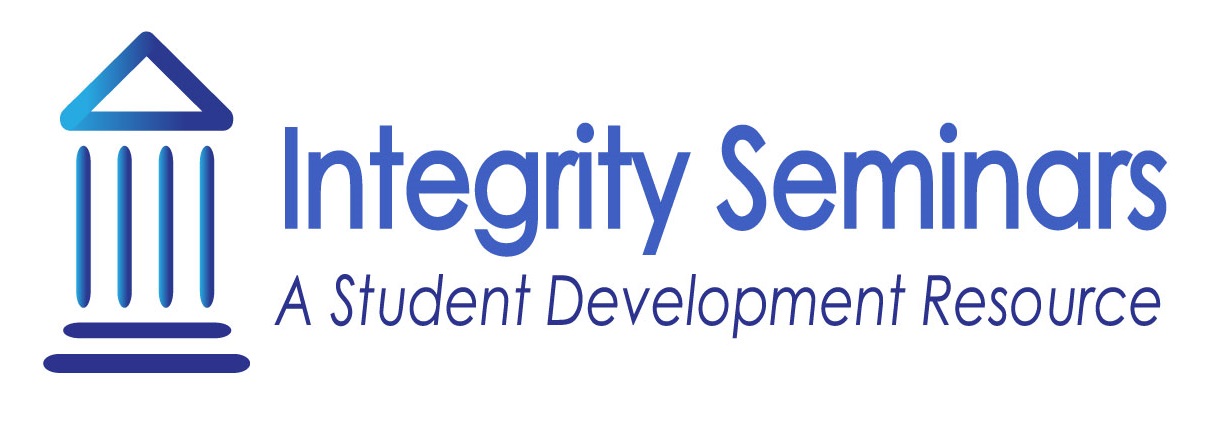The Seminar is designed to help students examine the importance of social trust and the components of emotional intelligence required to sustain it. We also seek to enhance critical thinking skills and help students write persuasive, well-reasoned essays.
Frequently Asked Questions
1) What is the aim of the Seminar?
2) Do you teach students about what plagiarism and cheating are?
The primary goal of our Seminar is about the why of cheating: “Why it is important to represent things truthfully?” “Why should students care about ethics when they get a job in business or in medicine?” “Why is it important to put honesty at the forefront of our lives?” However, our Blackboard course includes some plagiarism quizzes and modules to educate students on the basics of academic integrity and proper citation techniques.3) What is the general format of the Seminar?
The Academic Integrity Seminar is offered through an online Blackboard learning platform. The Blackboard platform is designed to enhance student engagement in an online setting that should be familiar to students. Students are usually assigned by referring educational institutions. Key components of the Seminar includes: 1. A learning module on the basics of academic integrity and proper citation techniques, with a quiz to test comprehension 2. Video content and interactive quizzes 3. Engaging readings, essay-style responses, and personalized review and feedback from our tutors 4. A certificate of completion that includes our tutor review and a copy of the student’s full essay responses4) Do students receive individual attention?
Yes. Personal attention is essential to what we do. This is not a machine-graded enterprise. We draw upon a common core of readings, but tutors frequently make additional suggestions tailored to individual students.
Our tutors (many with Ph.D.s or J.D.s with substantial professional experience) have taught thousands of Academic Integrity Seminar students. They understand typical student responses and can structure evaluations accordingly. It is not uncommon for tutors to ask follow-up questions designed to help individual students better understand and reflect upon the readings.
5) What empirical research guides your content?
Much of the information we share with students about human development is grounded on research from the Greater Good Science Center at the University of California at Berkeley and an ongoing (75 year) longitudinal study of human development at Harvard University called the “Grant Study”.
You can see Grant Study overviews and updates in this Harvard Magazine article (2001) and on HuffPost (2013). In his 2012 article “The Heart Grows Smarter,” The New York Times columnist David Brooks reviewed the Grant Study and wrote:
"Perhaps we could invent something called the Grant Effect, on the improvement of mass emotional intelligence over the decades. This gradual change might be one of the greatest contributors to progress and well-being that we’ve experienced in our lifetimes."
6) You emphasize the importance of gratitude statements. Why?
Research on gratitude statements (much of it done at UC-Berkeley’s Greater Good Science Center) is summarized by UC-Davis psychologist Robert Emmons:
“Our . . . research has shown that grateful people experience higher levels of positive emotions such as joy, enthusiasm, love, happiness, and optimism, and that the practice of gratitude as a discipline protects a person from the destructive impulses of envy, resentment, greed, and bitterness. We have discovered that a person who experiences gratitude is able to cope more effectively with everyday stress, may show increased resilience in the face of trauma-induced stress, and may recover more quickly from illness and benefit from greater physical health.”
7) What readings do you use?
All of our Seminars include selected stories. One reading we often use is Alan Greenspan’s Harvard University Commencement Speech. This exercise is designed to highlight the personal and economic benefits of emotional intelligence (empathy, impulse control and long-term thinking) in deciding how to live and work.
Here is a key quotation from the speech:
"I do not deny that many appear to have succeeded in a material way by cutting corners and manipulating associates, both in their professional and in their personal lives. But material success is possible in this world and far more satisfying when it comes without exploiting others. The true measure of a career is to be able to be content, even proud, that you succeeded without leaving a trail of casualties in your wake."
8) Your readings sometimes focus on philosophical questions like the definition of a ‘meaningful’ life. Why?
Harvard University Drew Faust posed a question to the Harvard College Faculty of Arts and Sciences in the aftermath of a cheating incident there:
“How do we—we who have devoted our lives to scholarship and teaching—how do we affirm and transmit the value—and the excitement—of learning for its own sake to our students in a world that increasingly urges them to think of their education in instrumental terms, urges them to focus on narrowly defined achievements and material outcomes?”
We think the answer includes helping students define a sense of purpose and become deeply engaged in learning related to that purpose. There’s no better way to encourage academic integrity.
We’re also influenced by the work of University of Virginia English Professor Mark Edmundson, author of Teacher: The One Who Made the Difference. Edmundson outlined his views in a 2003 New York Times article titled “How Teachers Can Stop Cheaters“:
“Speaking of his exchange with his pupils, Socrates, the founder of humanistic education, once observed: ‘What we’re engaged in here isn’t a chance conversation but a dialogue about the way we ought to live our lives.’ The closer we professors come to following Socrates, the less cheating we’re likely to see.”
9) How long does it take to complete the Seminar?
Most students complete the assigned readings and answer our questions in about 5-15 hours (one working weekend).
10) What is the cost of the Seminar?
The cost of the Seminar is $105, typically paid by the student. There is no charge to the referring institution, unless the institution prefers to pay the fee.
